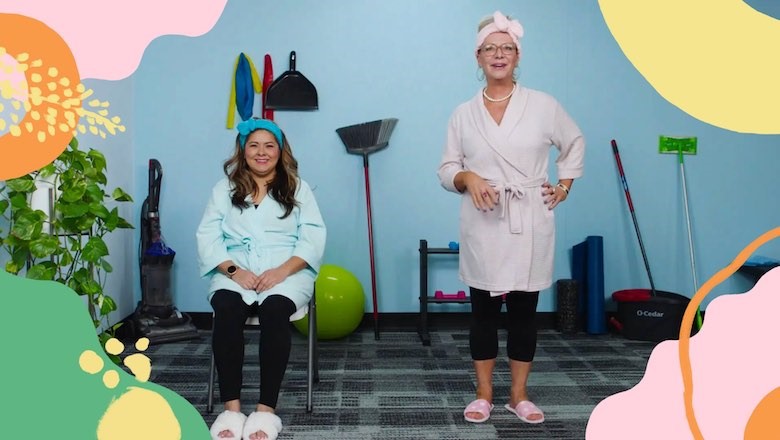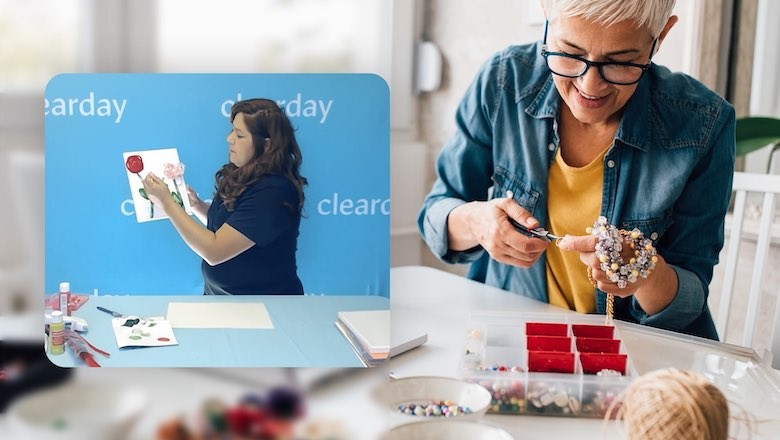Caregiver, you’ll be surprised by the benefits of cooking and cleaning, together.
Recreational, educational, and therapeutic activities are equally important. When caring for a loved one, caregivers should focus on activities that improve ability and independence. In our haste to get things done, we often forget that everyday chores—cooking, cleaning, and gardening—offer meaningful ways to include aging loved ones while promoting independence. Ultimately, these activities will engage care recipients, including people with dementia, to help them feel they are contributing in meaningful ways.
To help caregivers navigate various activities with loved ones, Clearday at Home™ has invited The Caregiver’s Voice readers to engage their loved ones in this free three-month complimentary membership via this sponsored post.

Clearday at Home™, a new online community, offers a fun spin on exercise for older adults of all mobility levels.
Think about how your care recipient feels.
Becoming a caregiver for a loved one is often not a planned event—for you or your loved one. Families need to adjust routines when another member has joined the household. It’s important to remember that your loved one is also adjusting in more ways than you may expect.
They may feel like a stranger in your home after leaving their home where they lived most of their life and raised their family. They may be confused by new surroundings and routines.
Depending on the stage of their dementia, they could be aware that they are forgetting things and grow frustrated while grieving for their old way of life. This is why it is important to include them as much as possible in your daily routine.
There are benefits to including loved ones in daily activities.
Loved ones with dementia need routine and activities they find meaningful in their own way. Giving them a choice and independence whenever possible is key to successful engagement. So, observe them as they do things and listen to them.
Start with inviting your care recipient to choose what to wear each day. For people with dementia, make decisions manageable with a choice of only two items. Let them dress themselves. Be nearby to provide assistance when asked. It may take them longer than you are willing to wait, but letting them do as much for themselves helps them feel a sense of achievement and independence. Ultimately, your patience will make your job as a caregiver, easier as they feel less frustrated and more involved.
They remember how to do things.
Memory loss does not take away all of one’s skills; especially, those they have done for a long time. Procedural memory engages long-term memory that is responsible for knowing how to do things. Types of procedural memory are motor, sensory, and cognitive:
- Motor memory includes waking, talking, how to use scissors, stir, carry, etc.
- Sensory memory includes smell, hearing, vision, touch, taste.
- Cognitive memory includes matching, sorting, reading, etc.
Procedural memory remains intact for routine habits and skills. Oftentimes, family caregivers are saddened by abilities their loved ones have lost. However, if you pay attention to the abilities your loved one still has, you’ll both have more fun. Consider the experiences people have making music together—from people with advanced dementia still playing piano and others singing or moving to the oldies.
How to include loved ones in meaningful activities.
For those caring for an aging loved one, Clearday at Home™ provides daily activities to make their day a good one—plus a support system to make sure you’re cared for, too.

Clearday at Home™ offers activities, like crafts, that use everyday objects to renew independence.
The Caregiver’s Voice and Clearday at Home™ invite you to enjoy a complimentary trial membership by clicking on this special link where you will find engaging daily activities, tailored exercises, and even caregiver support and education. These are ways to improve the time you spend caring for your loved one.

Barbara K. Schmidt MA, CTRS is a Guest Contributor at Clearday at Home™, a new online community for empowering family caregivers and their loved ones through daily activities, exercise, and caregiver support while caring for people with dementia including Alzheimer’s and physical challenges.









I really like your concept. It is an amazing article. Thanks for sharing this amazing blog.